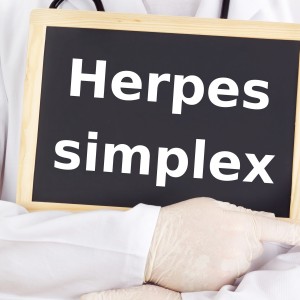
Herpes Simplex (HSV)
What is Herpes?
Genital herpes is a sexually transmitted disease (STD), caused by the herpes simplex virus. There are two strains of the virus, HSV I and HSV II. Although it has been commonly thought that HSV I affects only the lips, causing cold sores, and HSV II affects only the genitals, we now know that either strain can affect the genitals. So you can get a genital herpes infection from oral sex from someone with cold sores.
What are the symptoms of a herpes infection?
The initial infection causes the worst herpes symptoms, which may include:
- Fatigue
- Fever
- Joint or back aches and pains
- A cluster of painful bumps, sores or blisters in the genital area
- The sores may have been preceded by tingling or itching in that area (prodrome)
- Swollen lymph nodes in the groin
- The blisters can be followed by an ulcer when they rupture and then a scab
What Happens After the Initial Infection?
After the initial infection, the virus remains in your body. It can resurface as frequently as every 2-3 weeks, or not at all. Genital herpes is caused by HSV-1 and/or HSV-2. HSV-1 is recurrent in 55% of cases, and HSV-2 is in 90%. Subsequent herpes outbreaks vary in intensity and frequency depending on a number of factors. These factors include stress, hormone balance, and immune system function. Those who carry the virus can be contagious even without an active outbreak. Once contracted, there is no cure for herpes. But keeping your immune system healthy prevents outbreaks. Condom use helps prevent the transmission of the virus to others.
Is there a test for herpes?
Your doctor can take a scraping from a sore and send it for viral culture. A blood test can also be done to see if you have antibodies to the herpes virus in your bloodstream.
Herpes Drug Treatment
Conventional medications for treating herpes include the antivirals Acyclovir, Famciclovir, and Valacyclovir. These may be used only as needed when an outbreak occurs or may also be prescribed as a preventative measure.
Natural Treatment for Herpes
The naturopathic approach to herpes involves examining all aspects of health: hormone balance, immune system function, stress, exercise, diet, and vitamin or mineral deficiencies.
Hormone Balance
Hormones regulate immune system function. Women with HSV often notice that outbreaks coincide with the week before their period is due. Perimenopausal women may find that outbreaks are more frequent. A healthy hormone balance restores optimal immune system function.
Immune system
Several factors affect how well your immune system works: diet, stress, exercise, sleep, and vitamin or mineral deficiencies. Improving each of these factors can help boost your immune system so you can better control the virus.
Stress
Stress causes higher levels of cortisol, which lowers immune function. Helping your body manage stress as easily as possible can help the immune system work better.
Exercise
Regular, moderate exercise helps to keep your immune system strong and relieves stress.
Sleep, Relaxation and Downtime
Good quality and quantity of rest and sleep support a healthy immune system.
Vitamin/Mineral Deficiencies
Specific vitamins and minerals are required for normal immune function.
Vitamin A – A study in rats found that the immune response to HSV was higher in animals with sufficient vitamin A versus those who were vitamin A deficient.
β-Carotene – A 2012 study found that β-Carotene, a vitamin A precursor, can be considered a potential anti-inflammatory agent for DNA-virus infections such as HSV.
Zinc – Zinc is an essential mineral for healthy immune activity. Studies have shown that topical application of zinc sulphate can help clear up an existing outbreak but also help prolong the interval between outbreaks.
Vitamin C – Laboratory studies have demonstrated the effectiveness of vitamin C and copper at inactivating HSV.
Amino Acid Therapy
Lysine is an amino acid (a building block for protein) that can help suppress the replication of the herpes virus. Altering your diet to include more high-lysine foods can help, as can lysine supplementation.
Herbal Medicine
Several herbs, including lemon balm, licorice, berberine, Agaricus brasiliensis, Ganoderma lucidum, and Astragalus, have antiviral activity against HSV.
Diet
Foods high in carbohydrates and sugar suppress your immune system. Food sensitivities keep your immune system occupied fighting food instead of controlling the virus. I have had patients who would experience prodromal tingling almost immediately after eating a food-sensitivity food such as gluten or almonds. We can also tweak your lysine/arginine balance through your diet.
For help with this or any other health problem, book an appointment here or call the office for more information at 416-481-0222.
Authored by Dr. Pamela Frank, BSc(Hons), ND, updated April 4, 2025
Dr. Pamela has practiced as a naturopathic doctor in Toronto since 1999. She has received numerous “Best Naturopath in Toronto” awards. She is registered with the College of Naturopaths of Ontario.
Dr. Pamela Frank uses a natural treatment approach that may include acupuncture, herbal medicine, nutrition, diet, vitamins, supplements, and other natural remedies to restore balance and provide long-term resolution to almost any health problem.
Herpes Natural Treatment Research:
Kaushic C, Roth KL, Anipindi V, Xiu F. Increased prevalence of sexually transmitted viral infections in women: the role of female sex hormones in regulating susceptibility and immune responses. J Reprod Immunol. 2011 Mar;88(2):204-9. doi: 10.1016/j.jri.2010.12.004. Epub 2011 Feb 5.
Mahajan BB, Dhawan M, Singh R. Herpes genitalis – Topical zinc sulfate: An alternative therapeutic and modality. Indian J Sex Transm Dis. 2013 Jan;34(1):32-4. doi: 10.4103/0253-7184.112867.
Griffith RS, Walsh DE, Myrmel KH, Thompson RW, Behforooz A. Success of L-lysine therapy in frequently recurrent herpes simplex infection. Treatment and prophylaxis. Dermatologica. 1987;175(4):183-90.
Cardozo FT, Camelini CM, Mascarello A, Rossi MJ, Nunes RJ, Barardi CR, de Mendonça MM, Simões CM.Antiherpetic activity of a sulfated polysaccharide from Agaricus brasiliensis mycelia. Antiviral Res. 2011 Oct;92(1):108-14. doi: 10.1016/j.antiviral.2011.07.009. Epub 2011 Jul 20.
Chin LW, Cheng YW, Lin SS, Lai YY, Lin LY, Chou MY, Chou MC, Yang CC. Anti-herpes simplex virus effects of berberine from Coptidis rhizoma, a major component of a Chinese herbal medicine, Ching-Wei-San. Arch Virol. 2010 Dec;155(12):1933-41. doi: 10.1007/s00705-010-0779-9. Epub 2010 Aug 5.
Sun Y, Yang J. Experimental study of the effect of Astragalus membranaceus against herpes simplex virus type 1. Di Yi Jun Yi Da Xue Xue Bao. 2004 Jan;24(1):57-8.
Li Z, Liu J, Zhao Y. Possible mechanism underlying the antiherpetic activity of a proteoglycan isolated from the mycelia of Ganoderma lucidum in vitro. J Biochem Mol Biol. 2005 Jan 31;38(1):34-40.
